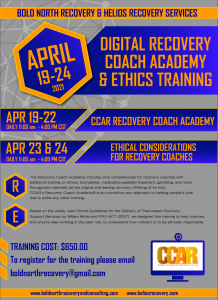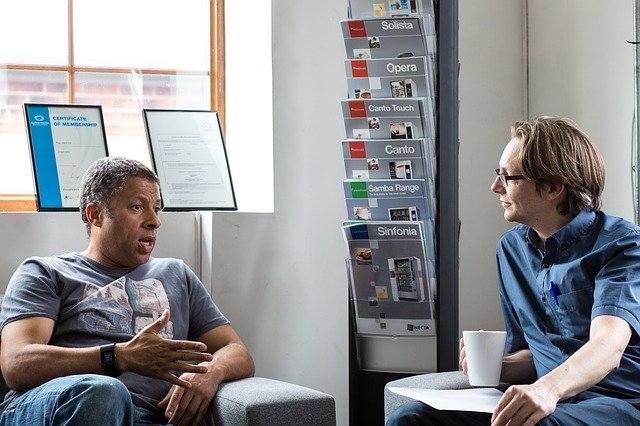 Hello All. I am excited to have another guest blogger with us this month. Irina’s work on Multiple Pathways of Recovery is truly challenging and needed as we look for ways to support people where they are at. This is one of the main tenants of Recovery Coaching, and we say it repeatedly. This can not be reiterated enough though I feel. Irina’s article below is somewhat geared toward professionals in the field of working with individuals, however, we can all learn something from it. I hope you enjoy her piece titled 12 Steps can’t save them all.
Hello All. I am excited to have another guest blogger with us this month. Irina’s work on Multiple Pathways of Recovery is truly challenging and needed as we look for ways to support people where they are at. This is one of the main tenants of Recovery Coaching, and we say it repeatedly. This can not be reiterated enough though I feel. Irina’s article below is somewhat geared toward professionals in the field of working with individuals, however, we can all learn something from it. I hope you enjoy her piece titled 12 Steps can’t save them all.
Save the date.
The next Recovery Coach Academy and Ethical Considerations digital training is taking place April 19-24, 2021. In The Rooms members will receive $50 off the cost by mentioning this blog in your registration email. Feel free to reach out if you have any questions.
– Jesse Heffernan, RCP
……………………………………………………………..
Quick disclaimer: I am not against 12 Steps, in fact, Choice in Recovery has had participation from Narcotics Anonymous, Cocaine Anonymous, and Alcoholics Anonymous since our start. I am against pretending this is the holy grail, only way, nothing else works, pathway to recovery.
Are you running a truly client-centered practice?
I hear it all of the time.
“We support the many pathways to recovery.” or, “We meet individuals where they are at (in their recovery journey).”
And here’s the thing. I don’t really believe it anymore.
After seven years of running Choice in Recovery and training industry professionals about the many pathways to recovery, I’ve realized a few things:
- A lot of people are quick to say that they support the many pathways to recovery and that they know what those pathways are.
- A lot of people are shocked to find out that they don’t know enough.
- Thankfully, most of these people are willing to acknowledge what they don’t know and are enthusiastic about learning so they can help their diverse clientele.
Why it matters.
Because 12 Steps can’t save em’ all and it’s the job of the industry professional to accept that and act accordingly.
One more time for the people in the back, the front, and the middle.
12 Steps can’t save em’ all and it’s the job of the industry professional to accept that and act accordingly.
One of the groups I train on the many pathways to recovery most often are individuals that are on their way to becoming recovery coaches. Truth be told – this is my favorite group of people to train because most of them are 12-Steppers. They are often in a unique position situated between the treatment world and the outside world.
But not every one of those trainings goes smoothly. Oftentimes there’s one individual that is really caught up in how 12 Steps saved their life. There can’t possibly be anything that works better for someone else. Ehm, keywords – for someone else. And all hell breaks loose when I bring up the topic of moderation (Moderation Management specifically), and non-abstinence based pathways. Some of the most common pushback I hear:
“No true alcoholic can moderate. I know, I’m an alcoholic and it didn’t work for me.”
Or:
“You’re telling people they can drink if they want to – aren’t you just enabling and endangering people?”
The Important aspects.
In addressing statement one, there is a point that really needs to be driven home. Yes12 Steps and abstinence saved your life (and I believe you when you say that it did). But that does not mean that it is guaranteed to save someone else’s. Also, acknowledging that 12 Steps might not work for someone else in no way diminishes the success you’ve had (or continue to have) with the program. In that same vein, just because moderation didn’t work for you does not mean that it won’t work for someone else. Or vice versa.
And what about statement two, is Moderation Management a dangerous slippery slope into ending up on the streets with a bottle in a bag and no way out? Well, I believe we have to have more faith in our peers’ ability to choose a pathway that works for them and their goals.
Second, our idea of where a person should be in their recovery journey and what they should do, cannot result in us intentionally withholding resources. Those resources may be the key to them attaining recovery. No matter what that looks like.
Individual paths.
Just like 12 Steps, I don’t think Moderation Management is for everyone. I do think it’s a great option for someone who is a problem drinker looking for support in getting their drinking under control. I’ve also seen it work for (and save the life of) someone who you could label as a chronic alcoholic. I’ve also met many people who claim Moderation Management eventually led them down an abstinence-based pathway. Pathways like LifeRing, or Women for Sobriety, but they claim Moderation Management was necessary to get them started.
Like every single pathway, results vary. This is exactly why we need to provide people with options, despite our personal opinion. This is also why it is our job as industry professionals (or soon-to-be-industry-professionals) to stay up to date on the available resources in our areas, and available resources online.
Where Choice in Recovery comes in.
Choice in Recovery exists to educate industry professionals on the many pathways to recovery. We empower industry professionals to run a truly client-centered practice; allowing all individuals to choose a recovery pathway that resonates with them.
And we don’t just tell you what’s out there. We teach you how to listen to your clients’ needs and provide them with relevant pathways that are most likely to work for them.
The secret ingredient in the Choice in Recovery sauce?
It’s learning to listen.
Specifically, to what your clients are saying and to what they want. It’s also knowing enough about the many pathways so you can quickly provide them with a few options that resonate with them.
What can you do today as an industry professional to help your clients?
First and foremost – get real honest about your personal biases about substance use disorders and recovery. We’ve all got them. That’s right, even yours truly can admit I still have feelings about particular pathways. Want to work on changing your biases? Awesome. Do that. But that’s actually not the important part.
The important part is recognizing that you have biases, putting them aside, and provide every possible choice to your clients. Do your research. I have actively worked with a plethora of representatives of the many pathways. Because of this, I know the ins and outs of many of the resources available today. However, I’m aware that there are more resources out there that the Choice in Recovery training doesn’t cover (this is good news). At the end of every skills training, I still encourage all participants to continue to do their research.
I hope that as we continue expanding on what it means to be in recovery, we also continue accepting the various pathways one can take in their personal journey. Whatever that looks like it’s all about the individual, and what works best for them.
To learn more about Choice in Recovery and the many pathways visit http://choiceinrecovery.net/.
Interested in becoming an expert on the many pathways to recovery?
Check out our course at https://choiceinrecovery.thinkific.com/.
About Irina Bogomolova:
 Irina is a Russian born, Colorado local-enough, University of Colorado at Boulder graduate; holding a BA in Sociology and Russian. Irina founded Choice in May of 2014; her own journey in which she chose moderation, inspired her to step into the field and express the need for various pathways to recovery. She quickly learned that they were out there, but that they were not known among the public, or professionals in the field. After networking and speaking to representatives of the many pathways, she built a team and together they began to educate the public and professionals in the field about the various options available.
Irina is a Russian born, Colorado local-enough, University of Colorado at Boulder graduate; holding a BA in Sociology and Russian. Irina founded Choice in May of 2014; her own journey in which she chose moderation, inspired her to step into the field and express the need for various pathways to recovery. She quickly learned that they were out there, but that they were not known among the public, or professionals in the field. After networking and speaking to representatives of the many pathways, she built a team and together they began to educate the public and professionals in the field about the various options available.
Outside of Choice, Irina is a freelance copywriter and spoken word artist. She also spends her time road biking, dog-walking, writing, reading, and performing at open mics across Denver (when it’s not pandemic-y out).


